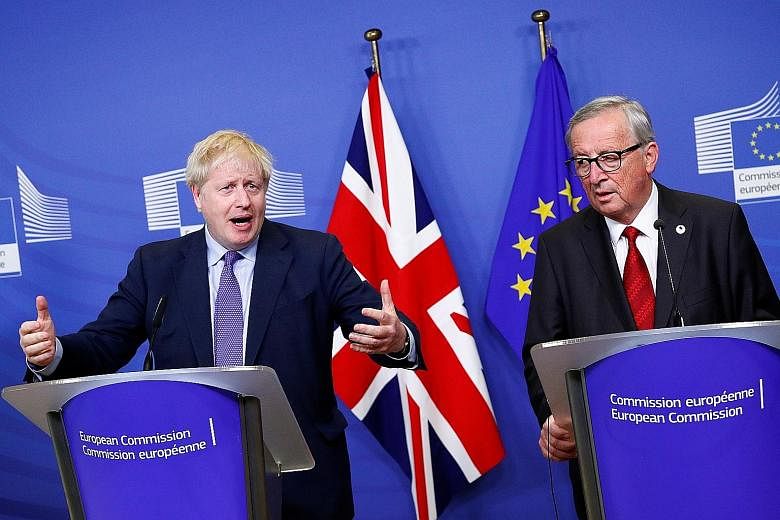BRUSSELS • Britain clinched a last-minute Brexit deal with the European Union yesterday, but still faces a challenge in getting it approved by Parliament.
"Where there is a will, there is a deal - we have one. It is a fair and balanced agreement for the EU and the UK, and it is a testament to our commitment to find solutions," European Commission President Jean-Claude Juncker said in a tweet a few hours before an EU summit in Brussels. He said he would recommend that leaders of the other 27 member states approve the deal.
Standing alongside Mr Juncker at a joint news conference in Brussels, British Prime Minister Boris Johnson said: "I hope very much ... that my fellow MPs in Westminster do now come together to get Brexit done, to get this excellent deal over the line and to deliver Brexit without any more delay.
"Now is the moment for us to get Brexit done, and then together to work on building our future partnership, which I think can be incredibly positive both for the UK and for the EU," he said, adding that Britain is a "quintessential European country".
If Mr Johnson gets his deal through, it will end three years of political turmoil since Britain voted to leave the world's biggest trading bloc - a journey that has strained its relationship with historic allies, soured the political debate at home and tested the patience of voters.
Mr Johnson is hoping to get approval for the agreement in a vote at an extraordinary session of the British Parliament tomorrow to pave the way for an orderly departure on Oct 31.
However, Northern Ireland's Democratic Unionist Party, which Mr Johnson needs to help ratify any agreement, has refused to support the new deal, saying the text was not acceptable - a step that could spur hardline Brexiters in his own Conservative Party to also oppose ratification unless he secures additional changes.
The main opposition Labour Party's leader Jeremy Corbyn said in Brussels he was "unhappy" with the deal and would vote against it. Lawmakers in his party said they had been told to vote for another referendum tomorrow.
Negotiators in Brussels and London this week have gone from optimism to dismay, and back again, with the pound twitching at every murmur. At the very least, businesses and travellers will be spared the inevitable disruption that would have been triggered by Britain leaving without a deal.
Nevertheless, the sterling surged more than 1 per cent and British share prices rallied after the announcement that an agreement had been reached.
Negotiators had worked frantically this week to agree on a draft compromise on the question of the Irish border, the most difficult part of Brexit, haggling over everything from Customs checks to the thorny issue of consent from the Northern Irish administration.
The conundrum was how to prevent the frontier from becoming a backdoor into the EU's single market without erecting checkpoints that could undermine the 1998 Good Friday Agreement, which ended decades of conflict in the province.
The agreement reached will keep Northern Ireland in the UK Customs area, but tariffs will apply on goods crossing from mainland Britain to Northern Ireland if they are deemed to be headed farther, to Ireland and the single market.
The agreement scraps the "backstop", a mechanism envisaged earlier that was designed to prevent a hard border being introduced on the island of Ireland, and would have bound Britain to some EU rules. The EU had long insisted that the backstop could not be removed.
Meanwhile, Mr Johnson will ask EU leaders to rule out another Brexit delay, and will not accept an extension if offered, a government source said yesterday, even though his Parliament has passed a law to oblige him to do just that if it has not agreed and ratified a deal by tomorrow.
REUTERS, BLOOMBERG











